Monday, May 15: Theories
I have a theory. In fact, I have three.
- The world is like a book.
Whether it’s Tuesday or Friday, when you open a book, the page is just as it was the last time you looked. Page 17 doesn’t magically mutate into page 26 just because a year has passed. It may have yellowed or become a little dog-eared, but page 17 remains page 17 forever.
I’ll admit that from time to time you might notice an edit or two. Perhaps the punctuation has been changed, or a paragraph deleted here, another added there. But generally speaking, the text is intact. And so it is with the world. Tel Aviv is Tel Aviv—exactly as we left it.
 The edits are small. We notice some fresh graffiti, a new sky scraper piercing the inevitable blue sky. But the city still pulses with life—pushy people, careening cars and yowling cats. Page 17 is still page 17 and I love it.
The edits are small. We notice some fresh graffiti, a new sky scraper piercing the inevitable blue sky. But the city still pulses with life—pushy people, careening cars and yowling cats. Page 17 is still page 17 and I love it.
2. The price of a thing increases in direct proportion to its distance from home.
For the next 5 weeks, our apartment at 15 Ge’ula is home, and I like to think of home as comfy and convenient.
Now, we travel with 2 very fine adaptors—odd little gizmos that morph into a dozen different pairs of prongs to stick into a foreign wall. But given that between A and me we have about 116 devices, I spend a good deal of time keeping them in rotation. There’s the plugging in, of course. Then the checking to see if the thing is fully juiced. Then unplugging and switching and plugging in again. It’s time I believe is poorly spent.
So I decided a few cheap adaptors would increase our convenience quotient and I found some around the corner for 8 shekels each (about $2.75). Being a cost-conscious buyer, I bought only 1, certain they’d be cheaper at the market.
My first project this morning was a hike to the Carmel market where I did, indeed, find exactly what I wanted. At the first stall, the seller wanted 15 shekels.
“15 shekels” I scoffed, “they’re only 8 on Ben Y’huda!”
“Don’t touch!” the man hollered, grabbing the adaptor out of my hand.
Farther down the line, I saw more. Thinking I might do better speaking Hebrew, I plumbed the depths of my meagre vocabulary and asked, “Cumma zeh?”
“20 shekels,” the man said.
The next vendor didn’t have any adaptors but told me not to pay more than 5 shekels. I agreed and continued on.
At the bottom of the lane I found yet one more vendor with a simple adaptor for sale. “How much?” I asked hopefully.
“30 shekels,” he said.
3. Choosing good travel shoes is like electing a president.
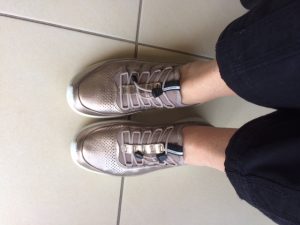 You look at the ads, you hear the hype, and you spend weeks in due diligence before making an informed decision. The goal is comfort and safety, and after a good deal of consideration, you choose accordingly. But shockingly, they fail to deliver.
You look at the ads, you hear the hype, and you spend weeks in due diligence before making an informed decision. The goal is comfort and safety, and after a good deal of consideration, you choose accordingly. But shockingly, they fail to deliver.
Only days into the term, and you know you’ve made a terrible mistake—but there’s no going back. You’re stuck with your decision. You question your intelligence and perhaps even your sanity. What were you thinking?
It turns out that what feels good in the confines of home may cause blisters in the real world. It’s a fact!
Wednesday, May 17: The Beach
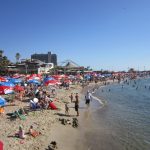 The sun bathers arrive early at the beach. Stout women in bikinis. Slender women in thongs. And for the elderly, underwear seems to be in style. An old man wanders by, his white jockeys wet and hanging low. An old woman in a sturdy black bra and panties schleps across the sand.
The sun bathers arrive early at the beach. Stout women in bikinis. Slender women in thongs. And for the elderly, underwear seems to be in style. An old man wanders by, his white jockeys wet and hanging low. An old woman in a sturdy black bra and panties schleps across the sand.
On the tayalit, they run in hordes, attached to earphones and heart monitors, fit and ferocious, muscles glistening. Tattoos bloom on naked body parts. Bicycles charge at you like a brace of buffaloes.
The orthodox walk toddlers and babies. The others walk dogs and take them to the dog park for play dates. A group of Arab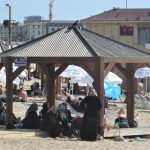 women gather in the shade of a wooden sun shelter and walk their children to the water’s edge. Umbrellas ruffle in the breeze. The sky is an endless cerulean blue.
women gather in the shade of a wooden sun shelter and walk their children to the water’s edge. Umbrellas ruffle in the breeze. The sky is an endless cerulean blue.
A is at home reviewing this afternoon’s lecture. I’m enjoying my morning cappuccino at La Mer. It’s a perfect day.
Thursday, May 18: Cats
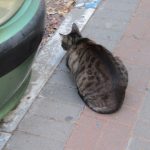 Tel Aviv is home to untold numbers of feral cats. Residents leave piles of dry cat food on top of the stone walls along the sidewalks—to be sure the cats are well nourished.
Tel Aviv is home to untold numbers of feral cats. Residents leave piles of dry cat food on top of the stone walls along the sidewalks—to be sure the cats are well nourished.
I ask my friend the judge, why they don’t neuter the cats. “That would be unjust,” she says. (I guess the cats must be allowed to self actualize.)
A tells me it’s because the cats perform a service by keeping down the numbers of rats. Israelis want their cats well fed.
But isn’t cat food rat food too?
Friday, May 19: Familiar Faces
I have another theory: there are only so many faces to go around.
I walk the busy streets and see a number of familiar faces—people I went to high school with, doctors I visited years ago, neighbors from home—but they are strangers. I’ve seen Alan Gold several times which is odd because I saw him only days before we left and he never said a word about his trip to Israel.
I saw a young Glenda Cassleman standing at the corner of our street waiting for the light to change. She couldn’t have been more than 18. And I spotted Joel Axelrod running on the tyalit. I haven’t seen him in over 40 years and he looked exactly as I remembered—surprisingly youthful for a man who must be nearing 80.
At a café on Dizengoff, I stopped for lunch and noticed Barry Sniderman sitting at the next table reading a local newspaper. I was stunned. I had no idea Barry was fluent in Hebrew. But it’s been a long time since I’ve seen him and people do surprise you. In any case, when he looked up, there was no recognition in his eyes.
Saturday, May 20: The Language Barrier
Our apartment is French. French dishwasher, French washing machine, French microwave and French TV stations. Our landlord is also French, which may have something to do with it.
There are printed instructions for all the equipment—in French. Sadly our vocabulary does not extend to knobs and dials, whatnots and whirligigs, so we turn to Youtube as a rescue resource.
 We get one news channel from France in English and in the last two days I’ve heard Trump described as a “buffoon”, a “serial liar” and “childlike in his ignorance”. C’est intéressant, n’est-ce pas?
We get one news channel from France in English and in the last two days I’ve heard Trump described as a “buffoon”, a “serial liar” and “childlike in his ignorance”. C’est intéressant, n’est-ce pas?
At present, Israeli sentiments seem mixed. We’ll see what happens after his visit. Our landlord’s English is worse than our Hebrew, so we communicate in French which may explain why, when A called him about a flood on our kitchen floor, Joseph rushed over to examine the ceiling.
In any case, we escaped our French connections today and hiked to Jaffa—a happening place on Shabbat. It was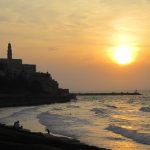 unusually cloudy and we stopped on a terrace by the sea for lunch. Other diners were dressed for a brisk Canadian winter with hoodies, scarves and thick, warm jackets. A single drop of rain (could we call it rain? maybe a bird spit! Once!) cleared the terrace instantly.
unusually cloudy and we stopped on a terrace by the sea for lunch. Other diners were dressed for a brisk Canadian winter with hoodies, scarves and thick, warm jackets. A single drop of rain (could we call it rain? maybe a bird spit! Once!) cleared the terrace instantly.
After a heavenly Jaffa day, we taxied home to dress for dinner and an evening at the Israeli philharmonic with friends. At symphony hall we flew to another level of heaven as Zubin Mehta conducted an angelic 13 year old phenom, Serena Wang, who brought a Mendelssohn concerto to its knees. Awesome!
Saturday, May 20: The Philharmonic
I wrote about this last year, but it’s worth repeating.
On an ordinary Friday morning rush hour, Joshua Bell arrived at the L’Enfant Plaza subway station in Washington DC. Looking like an everyday busker, he pulled out his Strad, tossed a few seed coins into his violin case, and began to play “Chaconne” from Bach’s Partita No. 2 in D Minor, a piece he describes as, “not just one of the greatest pieces of music ever written, but one of the greatest achievements of any man in history.”
Bell was part of an experiment by The Washington Post to see if, “In a banal setting at an inconvenient time, would beauty transcend?” It did not.
More than 1500 people hustled by failing to notice as one of the world’s greatest violinists played an hour of virtuoso solos. Barely a handful stopped even for a moment to listen. Bell made $32.00 that day.
I like to th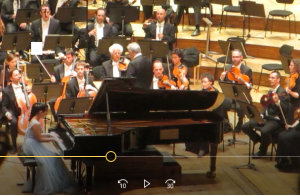 ink I would have stopped. I like to think I would have been riveted to the spot and you couldn’t have torn me away. And after hearing Bell’s awesome performance with the Israel Philharmonic last year, we bought tickets this year—so we could join our friends for dinner and another amazing musical evening.
ink I would have stopped. I like to think I would have been riveted to the spot and you couldn’t have torn me away. And after hearing Bell’s awesome performance with the Israel Philharmonic last year, we bought tickets this year—so we could join our friends for dinner and another amazing musical evening.
The hall is heavenly and the orchestra superb. And while I found Beethoven’s 8th less than exciting, Zubin Mehta was at his charismatic, wonderful best. And still, it got better.
Tiny and simply angelic, 13 year-old Serena Wang entered in a diaphanous blue gown, pony tail bouncing as she crossed the stage to the piano. She sat down, swept the keys with a hankie, nodded to Mehta, and proceeded to play the hell out of Mendelssohn’s piano concerto no. 1.
BTW, if you’re interested in the Bell experiment, it’s at www.youtube.com/watch?v=hnOPu0_YWhw
Monday, May 22: Puzzles
This is a country of contradictions.
If there are rules, nobody follows them. People step off the curb while the don’t walk sign flashes. Cars careen about at astounding speeds, but everyone stops for pedestrians—waiting with infinite patience as schleppers cross against the light.
While they seem to be eating constantly, there is no obesity here—except for tourists.
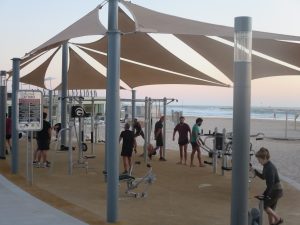 Israelis are fitness addicts. Wherever you look, they are stretching and lunging, running and hanging from poles chinning themselves. Narrow-waisted and broad where gender dictates, they radiate energy and good health. They play beach volleyball at sundown and eat endless salads—and they smoke like demons.
Israelis are fitness addicts. Wherever you look, they are stretching and lunging, running and hanging from poles chinning themselves. Narrow-waisted and broad where gender dictates, they radiate energy and good health. They play beach volleyball at sundown and eat endless salads—and they smoke like demons.
Honking is a sport everyone plays.
On the streets, female soldiers wear sandals with perfectly polished toes and an uzi and purse slung over one shoulder.
Swimmers wade into the sea under red “danger” flags and “swimming is forbidden” signs while lifeguards blast stern warnings.
They’re meticulous about recycling plastics, conserving electricity and saving water. But trash litters the streets and I’ve never seen a single person stoop to scoop or check the drek.
Single state? Two states? More than anything, I think this country is a state of mind. Yesterday, while walking on a small side street, a young man in jeans and tee shirt passed by me carrying a machine gun. Was he a terrorist? A soldier out of uniform? I couldn’t tell, so I walked on.
Tuesday, May 23: The forces of destiny
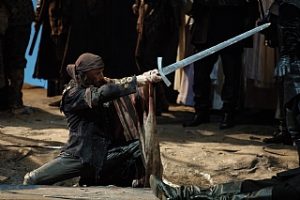 We went to the opera last night. The tickets were a gift from dear friends—wonderful people who are always extraordinarily kind to us on our visits here.
We went to the opera last night. The tickets were a gift from dear friends—wonderful people who are always extraordinarily kind to us on our visits here.
International star Susanna Branchini sang Leonora, a lovely soprano with a lot to complain about in one of Verdi’s most popular operas, La Forza del Destino. Tenor Gustavo Porta sang the ill-fated Don Alvero role. Always in the wrong place at the wrong time, the unfortunate man survived—unlike his darling Leonora, poor thing. Daniel Oren conducted. But I digress.
It was a joy—all of it. The perfect-pitch hall, the wonderful voices, the imaginative staging, and the extraordinary clarinet wailing a sorrowful solo. Totally thrilling!
We may dream about La Scala or The Met. We may hanker for an evening at the Sydney Opera House or the gorgeous Paris Opéra. But it’s time to put Tel Aviv on the premier list.
Wednesday, May 24: Neve Tzedek
I walked to Neve Tzedek today with the goal of making my way to Shabazi Street on a mission to find toothpaste and the ultimate linen dress. Shabazi is just off Pines which I (like you, no doubt) mistakenly thought was pronounced like the tree. It’s actually 2 syllables; the i is pronounced like ee, the e is a short i. Try it!
Anyway, Neve Tzedek was the first Tel Aviv neighbourhood and after falling into ruin, it’s been gentrified and the old stone buildings are now a riot of little shops, restaurants and boutiques with price tags too high to divide by 3 in my head.
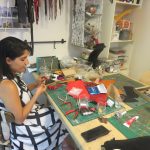 The jewelry is wonderfully different and it’s not unusual to find the designer making another collection right there
The jewelry is wonderfully different and it’s not unusual to find the designer making another collection right there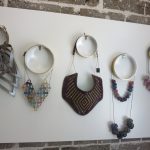 in the shop. The shoes are perfect—for someone else’s feet. And the dresses…
in the shop. The shoes are perfect—for someone else’s feet. And the dresses…
I found what I was looking for at Kedem Sasson. He’s a talented Israeli designer who makes gorgeous over-sized dresses which, on a hot day, could double as shelter for a family of 12 and a couple of camels. But they were much too costly and besides, I’m not sure they’d translate.
The cappuccino was within my budget and I enjoyed it immensely. I forgot the toothpaste.
Friday, May 26: Jerusalem
Jerusalem is to Tel Aviv as Hegel is to Seinfeld. The first is impenetrably dense. The second, a light take on life.
A booked us into Mishkenot Shenanim, a charming guest-house/conference centre reserved for academics and artists. Thursday morning, we took an early bus from the central bus station, checked into our guesthouse under the windmill by 11, and headed through the artist colony straight for the old city.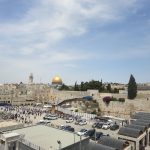
Hundreds of steps polished to a sheen by thousands of feet, it was a slippery trek downhill, then up again towards the old city walls. I walked carefully, reminding myself I am one cobblestone away from a titanium hip.
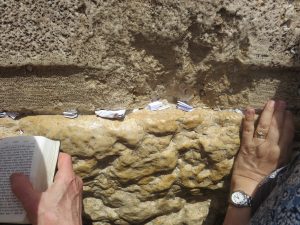 We didn’t realize it when we made our plans, but it was Jerusalem Day—50 years ago Jerusalem was liberated—and on Thursday, the old city was jammed with the usual Bar mitzvah celebrants, the orthodox at prayer, soldiers, garden-variety visitors and a gaggle of tour groups—Jews and Christians by the bus load. Getting to the wall required serious navigation skills, but we made it.
We didn’t realize it when we made our plans, but it was Jerusalem Day—50 years ago Jerusalem was liberated—and on Thursday, the old city was jammed with the usual Bar mitzvah celebrants, the orthodox at prayer, soldiers, garden-variety visitors and a gaggle of tour groups—Jews and Christians by the bus load. Getting to the wall required serious navigation skills, but we made it.
How to explain the surge of emotion in that special place? I can’t. Religious or not, it’s overwhelming.
After the wall, I convinced A a 20 minute trip to the suq was essential (I’d hoped to find a special necklace as a memento of this trip). A listed the range of horrors that might befall me, the dozen different ways I could meet my demise, the gruesome risks not covered by our insurance policy. He wasn’t happy. But he found himself a shady spot, we synchronized watches, and I went off to do my thing.
At the end of the first narrow alley, I discovered a particularly interesting jewelry booth where a gorgeous string of amber beads with silver decorations hung from a hook, calling my name.
Achmed, the jeweler, was very helpful. “70 shekels (about $23) each,” he said.
“Each bead?”
“Of course,” he said. “All together, about $1000. American dollars. But I will string them for you and today, you can have them for only $600.”
I laughed. “That’s about $400 more than I can afford,” I said.
“Okay, $500.”
He followed me waving the beads as I backed out of the booth laughing. By the time I’d reached the threshold, the price had slid to $150. But my 20 minutes was up, A was waiting for me, and I reluctantly left the beads behind.
For dinner, we found a wonderful little restaurant very near our hotel: Olive and Fish. I had chicken livers with pears and cognac, a strange and fantastic combination. A had mango chicken—amazing!
This is a fertile city—all the cats and women are pregnant. The streets are rich with history and extremes of every stripe. Heads are covered with kipas, streimels, keffiyeh, hijabs, burkas, and gleaming hair proclaiming genuine synthetic. But the panorama is a harmonious monochrome of sand-colored Jerusalem stone, chiseled edges catching the sun. It is beautiful beyond words.
Friday morning I made a beeline for the Mamilla mall which, sadly, has morphed into a splashy centre for American brands. Now, I’m not mad for Steve Madden, and the chasm between me and the Gap is too wide to cross, so I found nothing of interest.
Meanwhile, A had trundled off to his beloved Rechovia where we met for lunch and then a lovely traipse through Ben Yehuda’s schlock shops.
We caught the bus for home before Shabbat and the end of bus service.
So far, I have bought a pair of socks—the single best shoe solution on the planet.
Monday, May 29: Super Jews
Like Delilah, these people pay a lot of attention to hair. It’s the land of milk and honey blondes—and platinums, reds, fuscias and every conceivable colour—some inconceivable too. Hair may be ratted, teased, plaited, tortured or twisted, piled, shaved or sharpened into points. It’s a wonderment.
And so are the people under the hair. These super Jews can do everything—and they do.
They are the doctors, soldiers, teachers and garbage collectors. On the streets, they huck and clang, sell groceries, lay bricks and person the cranes. In hospitals, incubators and research centers, they lead the world.
And in this normalized Israel, they are the hookers too. I’ve seen their business cards on the sidewalks.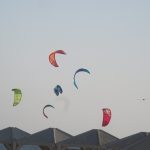
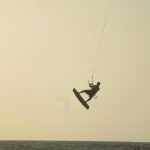 But last night I went to the beach to watch the sun set. It was a breezy evening and a splendid sight. The sky was ablaze as young men, harnessed to massive kites, teetered on surfboards skimming magically across the waves under a sinking sun.
But last night I went to the beach to watch the sun set. It was a breezy evening and a splendid sight. The sky was ablaze as young men, harnessed to massive kites, teetered on surfboards skimming magically across the waves under a sinking sun.
Tuesday, May 30: Eureka!
I found a Gottex outlet around the corner which, for the uninitiated, is like tripping over a gold mine in a sandbox. Gottex makes amazing bathing suits—and they were gorgeous, of course, but even if I want to think 72 is the new 71, every woman knows shopping for a bathing suit is torment; the mirror doesn’t lie.
Eventually, I chose the blue—in part because it matches my spider veins, in part as a way of saying thank you to the patient saleswoman whose job, it seemed to me, was to shift my jiggly bits into the proper compartments—a skill I’ve never needed before but one I plan to master.
Wednesday, May 31: Things I have noticed
- Our appliances hate us. I’ve managed to beat the washer and dryer into submission, but the dishwasher insists we close the door and press cancel to turn it on. We play a game with the microwave, pushing buttons in no particular order, and occasionally it lets us win. But the stove will not. It’s gas, and while it clicks away heartily when we turn the knobs, it refuses to light. We’re convinced it wants to asphyxiate us in our sleep, so we leave it alone.
- Even with shoes, fine sand crawls between the toes creating the effect of a tiny emery board.
- At 10,000 steps, my Fitbit celebrates while I have a small coronary.
- Israelis speak Hebrew except when they don’t want you to understand. Then they speak English
- I slather SPF 60 on my face and wear a hat the size of a golf umbrella, but the age spot on my cheek is blooming under the sun.
- I have become a magnet for old men. Maybe I should be flattered, but they are probably no older than I am and I find their walkers unnerving.
- Baklava is a food group.
- In Tel Aviv, sidewalks are for skateboards, bikes, scooters, motorized wheels and roller skates. Pedestrians, I think, are expected to walk on water.
Thursday, June 1: No Words
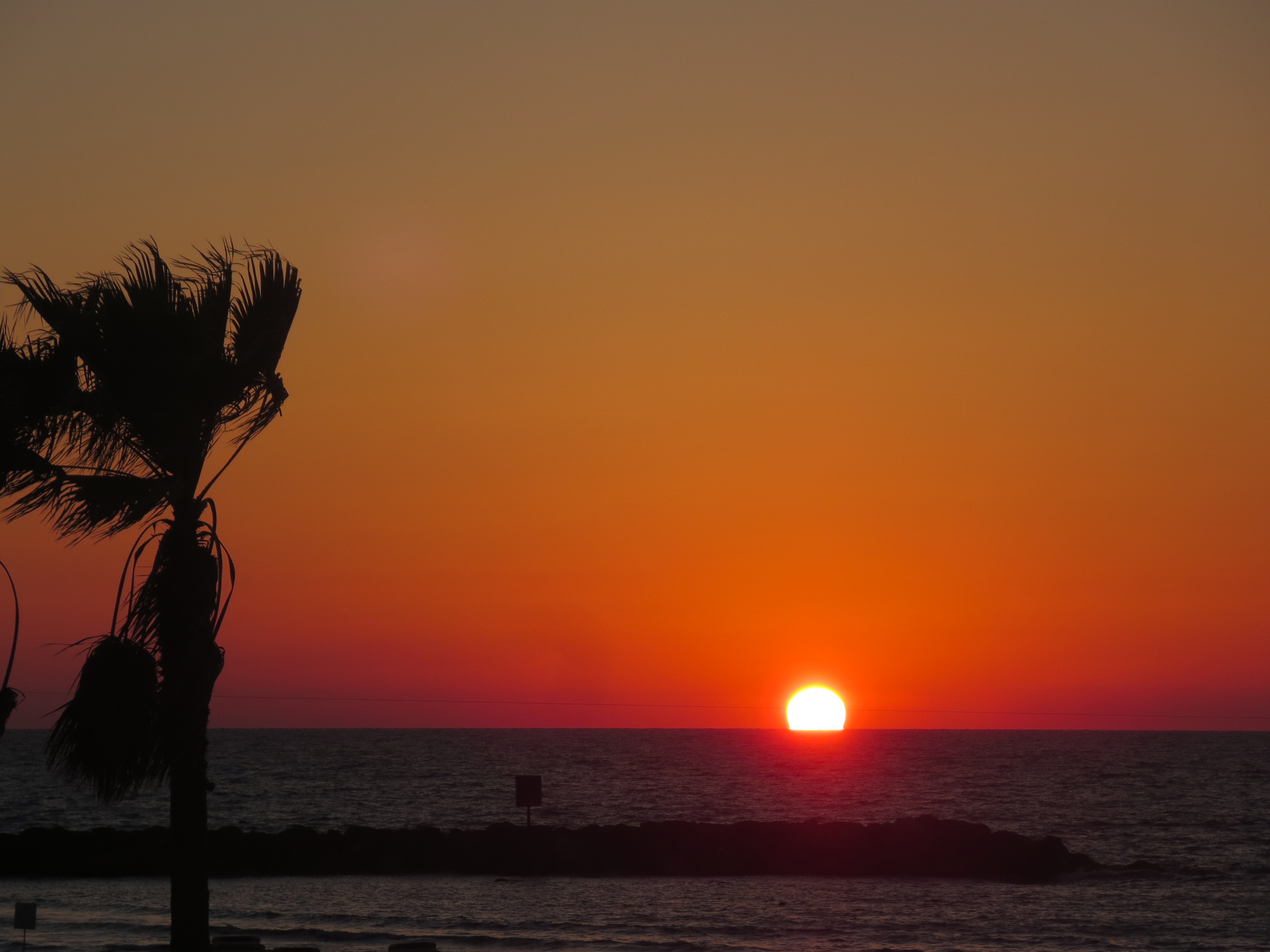
Saturday, June 2: Updates
My friend Marsha (who knows about these things) reminds me I’ve written my blog backwards. The most recent post should be at the top—not the bottom. I’d forgotten.
But I’m in Israel after all, where everything is backwards. The week begins on Sunday. Text reads from right to left. Adjectives follow nouns instead of preceding them as they should. Our dishwasher works only when we press cancel, and the guest-house air conditioning refused to turn on until we switched the dial to off.
So, be it.
Saturday, June 2: Shabbat on the Beach
I turn left instead of my usual right when I reach the beach and follow the tonk, tonk, tonk of the paddle boards. The nearest cafe is a mass of humanity—not 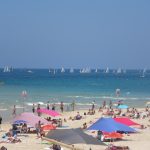 a vacant umbrella, not an empty chair. I give up on my lemonade plan and find a bench. Beside me, a cat makes his own shade.
a vacant umbrella, not an empty chair. I give up on my lemonade plan and find a bench. Beside me, a cat makes his own shade.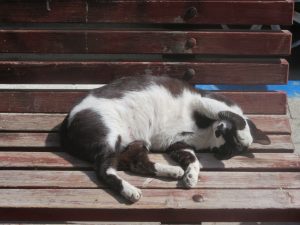
Now that I’ve become inured to the tattoos, I notice the nipple rings. (The women may wear them too, but their postage stamp bikinis hide the evidence.) And I wonder if this too is normalization.
Flip flops are the shoes of choice—except for Russian women who trip along on sky-high platforms, and Americans who are welded to their running shoes.
The sea is a luminous turquoise reaching for a strip of midnight blue at the horizon. The sailboats are out. Young women do push-ups on the tayalit. Young men push strollers and plug in pacifiers. One man runs backwards, toning his glutes.
Living here, you get a different twist on things. Today’s news from the BBC following Trump’s withdrawal from the Paris climate accord: “A more vulgar, malevolent brute has never before occupied the White House.” And “it’s a terrible blow to American leadership…there will now be a new world order.” And it looks like China will fill it.
I’ll think about it tomorrow. Call me Scarlett.
Tuesday, June 5: Tel Aviv University
I met Zipi over dinner at the home of a mutual friend. She’s an amazing woman who retired from a successful career in law and banking to do only what pleases her most–volunteering her talents. Turns out, Zipi is a well-connected dynamo.
Graciously, she offered to show me Tel Aviv University (TAU). While I’ve been there before, I accepted, hoping to spend a few pleasant hours wandering around the campus.
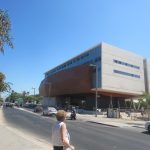 But someone decided I deserved a VIP tour, and that’s what I got. It began in the soon-to-be-opened Steinhardt Museum of Natural History—the only museum of its kind in the Middle East. It will be housed in an extraordinary building that will contain five and a half million plants and animals.
But someone decided I deserved a VIP tour, and that’s what I got. It began in the soon-to-be-opened Steinhardt Museum of Natural History—the only museum of its kind in the Middle East. It will be housed in an extraordinary building that will contain five and a half million plants and animals.
Did you know that elephants are born with incisors that become tusks and a set of 6 molars on each side? The first set of molars are baby teeth and fall out. The next are not. And when they wear down from grinding bark and tough grasses, they are replaced with another brick-like set that has erupted behind the old ones and pushes them out. An elephant gets 6 sets of teeth rotations over a 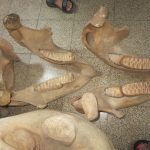 lifetime and when the last set wears out, the animal dies of starvation. True!
lifetime and when the last set wears out, the animal dies of starvation. True!
Did you know that birds’ wings have a humerus, ulna and radius? That whales have 5 phalanges in their pectoral fins that correspond  exactly to a hand? That the similarities between species far exceeds the differences?
exactly to a hand? That the similarities between species far exceeds the differences?
I found out all that good stuff after first meeting the coordinator who explained the building with its broad wooden arch overhanging the entryway (a nod to Noah) and told me the biggest challenge of the 21st century is environmental degradation and overuse of natural resources, which makes this center crucial—not only to educate the uneducated, but to record and research. Here, scientists track bio diversity through space and time because whether it’s bees pollinating plants or cat scat spreading seeds, we depend on our ecosystems for the services they provide. In short, we need a diverse ecosystem for our own survival.
Then I met Amos Belmaker, ornotholigist and chief honcho of the collections. He introduced me to a room full of stuffed animals that had once crawled, leapt and  soared over this land—and are now extinct. We looked at drawers filled with birds, shelves of small animals, and more drawers with a collection of bird’s eggs. And then we got to elephants and bones—my fav.
soared over this land—and are now extinct. We looked at drawers filled with birds, shelves of small animals, and more drawers with a collection of bird’s eggs. And then we got to elephants and bones—my fav.
Next came the medical labs where I met the Vice Dean whose research focuses on the effects of genetics on hearing loss. And I learned about TAU’s breakthrough work on melanoma and Alzheimer’s.
A quick introduction to TAU President Joseph Klafter and a trip to the gift shop, of course.
I can’t wait to go back next year and if I were you, I’d think of the Steinhardt Museum of Natural History as a “must see” on your next visit to Tel Aviv.
Thank you Zipi. It was an extraordinary day
Saturday, June 10: Shabbat
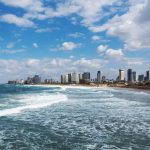 There are clouds in the sky today—not enough to block the sun, but enough to churn the waves and change the color of the sea. The red caution flag is up. Whitecaps are rolling in, but the bathers are fearless. Surfers paddle out to catch a big one. There is a steady breeze; the kites will be out this evening.
There are clouds in the sky today—not enough to block the sun, but enough to churn the waves and change the color of the sea. The red caution flag is up. Whitecaps are rolling in, but the bathers are fearless. Surfers paddle out to catch a big one. There is a steady breeze; the kites will be out this evening.
I watch a group of young men play volleyball in the sand. Only four on each side, but they have taken the time to mark the court with blue tape and they’re reasonably good.
After a while, one of the players is replaced by a young woman. Slightly overweight, she wears a thong and her cheeks jiggle as she trots across the beach to join her side. Perhaps she’s gained a little since she bought the suit. Or maybe she held herself just so in front of the shop mirror and liked what she saw. In any case, she is confident as she runs. And she is a strong player. Her team does not suffer on her account.
It’s Shabbat and the roads are nearly empty. Still, it pays to pay attention. I was hit by a bicycle yesterday. I heard him ring his bell behind me on my right, but another bike was charging towards me on the left and I froze.
“Boker tov (good morning)” he said as he smashed into me.
He did not stop to see if I was injured. Just my pride.
Saturday, June 10: Opera?
The sea is flat this morning. It must have worn itself out last night. Or perhaps it’s under the surface holding its breath.
We held our breath last night, captivated by the glorious voice of Rinnat Moriah in the role of Susanna under the dancing baton of Dan Ettinger.
Flamboyant and charismatic, Ettinger at once conducted, played a perfect harpsichord and kept the fireworks going in The marriage of Figaro with the Israeli Philharmonic. Canadian bass-baritone was splendid as Figaro.
How to explain it? It was a concert performance of the opera—not an opera. No costumes. No sets. The singers hid amongst the musicians coming forward as Ettinger pointed in their direction. An orchestrated madness, fantastic to watch.
Monday, June 12: Mission in Jaffa
We were on a mission: to find a special gift for our friends who are so extraordinarily kind to us on our visits here. I had settled on a piece of handmade pottery or glass. We wanted them to know how much we appreciate their friendship.
I’d walked the streets of Tel Aviv for days and hadn’t found what I was looking for. Google suggested Jaffa would be a better place to search and I made note of the address of the most promising gallery where, according to their site, 8 talented potters sold their wares.
The number 10 bus took us straight to Jaffa and dropped us midway up the main street, directly in front of a window with an amazing collection of shoes on display. Serendipity!
A small sign said: shoe factory. I imagined real cobblers sitting in the back molding leather.
But we didn’t have time to check it out. We were on a mission.
We hustled through the streets near the flea market searching for the address I’d written down. Kitsch and schlock piled high, oh my, but no galleries.
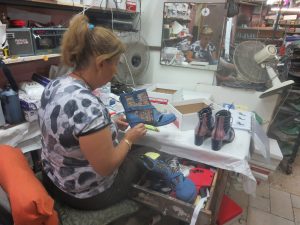 When we finally found the address, the gallery did not exist. But ever resolute, we decided to trek up to the artists’ colony on the other side of town—a winding warren of shops, private homes and galleries meandering over the hills of Jaffa. Breathtakingly beautiful.
When we finally found the address, the gallery did not exist. But ever resolute, we decided to trek up to the artists’ colony on the other side of town—a winding warren of shops, private homes and galleries meandering over the hills of Jaffa. Breathtakingly beautiful.
It was hot and it was high, and it was useless. Lots of jewelry, plenty of paintings, and enough Meisler to cover a continent, but not a pot or piece of glass to be found.
A gave up and decided to go home.
I stayed. And bought shoes. Handmade—by real cobblers sitting in the back molding leather.
Tuesday, June 13: The Craft Market
Tuesday is an arts and crafts market day on Nachlat Benyamin. It’s just around the corner from our apartment and I’ve gone there often, but never found anything that calls my name.
Still, I was on the hunt for a special gift and returned for another look-see.
For the most part, the jewelry was uninspired, the knick-knacks typically touristy, and the pottery amateurish. There were some well-made olive wood boxes, but so what?
And then I found it. On a table near the far end, a display of finely made bowls, pitchers and platters. Now, I’ve done a lot of potting in my time, and I know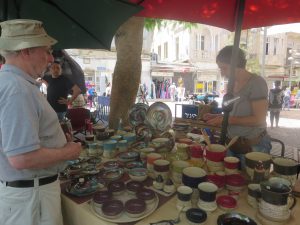 skilled wheel work when I see it. (I’ve been known to drool over a well-made wall.) I believe there’s a point at which craft becomes art, and this was surely that.
skilled wheel work when I see it. (I’ve been known to drool over a well-made wall.) I believe there’s a point at which craft becomes art, and this was surely that.
I admired the work and praised the artist. She beamed. I chose a beautiful, signed platter with thin, even walls and a perfectly smooth, clear glaze with colored slip artfully applied under the shiny surface.
“I’ll take it,” I said. “It’s a gift.” And it was.
Wednesday, June 14: Where are we?
A young American couple took the table next to mine on the beach this morning and asked for a menu. “Is this in American dollars or shekels?” The woman asked.
Thursday, June 15: Disaster strikes
Every apartment has a safe room. Our is the second bedroom with thick cement walls, a heavy door, and a solid, steel pocket shutter that pulls across the window, sealing it tight. It’s the room A uses as a study and while it may be a safe room, that’s where the disaster happened.
I heard a terrible crash and charged into the room to find A standing over what had been his desk—now collapsed. Worst of all, his computer had crashed to the white tile floor. Disaster.
Luckily, he had submitted the final corrections to the galleys of his latest book on Monday. Still…
We reassembled the desk and A tried the computer. Nothing. He hit a few keys. Removed the battery. Replaced it and tried again. Black screen. Nothing.
In the morning while A was at school, I thought I’d give it a shot. I’m no tech-whiz, but I’m a great Googler. I tried the assist key, the F8 key, the chat rooms and the help lines. I even ran a diagnosis exactly as Sony instructed. The blue screen of death! “Disc error found” it said. (Even Google had no suggestions.)
In the morning, A took it to an IT guy who checked it out and pronounced it DOA.
Looks like it’s time to go home.